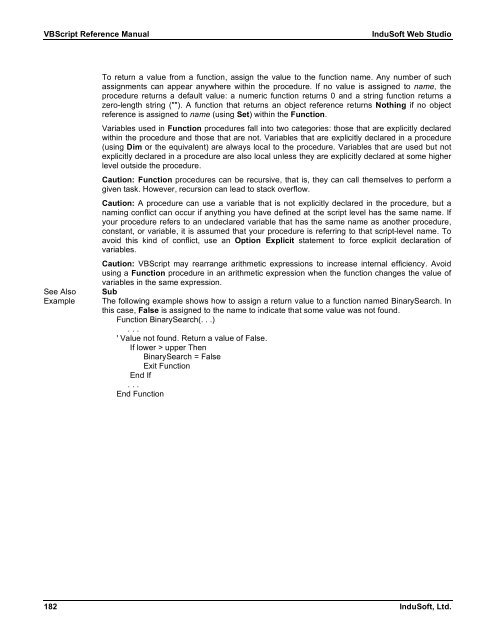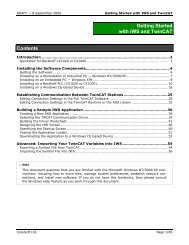VBScript Reference Manual for InduSoft Web Studio
VBScript Reference Manual for InduSoft Web Studio
VBScript Reference Manual for InduSoft Web Studio
Create successful ePaper yourself
Turn your PDF publications into a flip-book with our unique Google optimized e-Paper software.
<strong>VBScript</strong> <strong>Reference</strong> <strong>Manual</strong> <strong>InduSoft</strong> <strong>Web</strong> <strong>Studio</strong><br />
To return a value from a function, assign the value to the function name. Any number of such<br />
assignments can appear anywhere within the procedure. If no value is assigned to name, the<br />
procedure returns a default value: a numeric function returns 0 and a string function returns a<br />
zero-length string (""). A function that returns an object reference returns Nothing if no object<br />
reference is assigned to name (using Set) within the Function.<br />
Variables used in Function procedures fall into two categories: those that are explicitly declared<br />
within the procedure and those that are not. Variables that are explicitly declared in a procedure<br />
(using Dim or the equivalent) are always local to the procedure. Variables that are used but not<br />
explicitly declared in a procedure are also local unless they are explicitly declared at some higher<br />
level outside the procedure.<br />
Caution: Function procedures can be recursive, that is, they can call themselves to per<strong>for</strong>m a<br />
given task. However, recursion can lead to stack overflow.<br />
Caution: A procedure can use a variable that is not explicitly declared in the procedure, but a<br />
naming conflict can occur if anything you have defined at the script level has the same name. If<br />
your procedure refers to an undeclared variable that has the same name as another procedure,<br />
constant, or variable, it is assumed that your procedure is referring to that script-level name. To<br />
avoid this kind of conflict, use an Option Explicit statement to <strong>for</strong>ce explicit declaration of<br />
variables.<br />
Caution: <strong>VBScript</strong> may rearrange arithmetic expressions to increase internal efficiency. Avoid<br />
using a Function procedure in an arithmetic expression when the function changes the value of<br />
variables in the same expression.<br />
See Also Sub<br />
Example The following example shows how to assign a return value to a function named BinarySearch. In<br />
this case, False is assigned to the name to indicate that some value was not found.<br />
Function BinarySearch(. . .)<br />
. . .<br />
' Value not found. Return a value of False.<br />
If lower > upper Then<br />
BinarySearch = False<br />
Exit Function<br />
End If<br />
. . .<br />
End Function<br />
182 <strong>InduSoft</strong>, Ltd.



